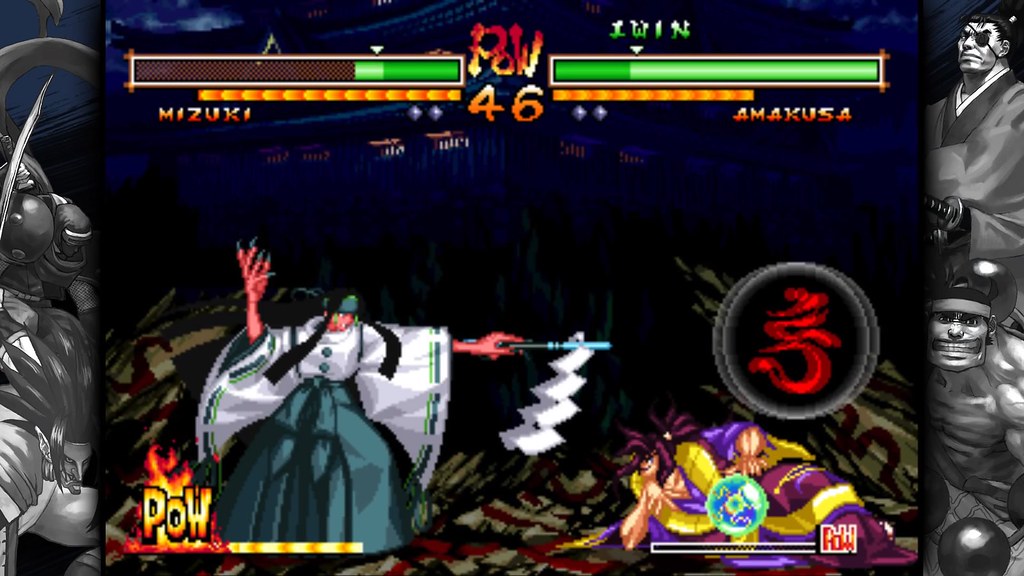
Samurai shodown anthology censored license#
For Azumanga Daioh, Yen Press's license of the manga was a month before Shogakukan reprinted the manga in May 2009, resulting in a change of license holders from ASCII Media Works (when Yen Press announced the license) to Shogakukan (when Yen Press released it). Shogakukan permitted Tokyopop to license Corrector Yui, Udon Entertainment to license the Infini-T Force manga (even though Viz Media licensed the anime), the now-defunct ComicsOne to license Wounded Man - The White Haired Demon, permitted Dark Horse Comics to license Crying Freeman (even though it was previously licensed by VIZ), New Lone Wolf and Cub (however, this is because Dark Horse has the original series), The Legend of Zelda: Skyward Sword and Mob Psycho 100, and permitted Hachette Book Group's subsidiary Yen Press to license Azumanga Daioh, Silver Spoon, Karakai Jōzu no Takagi-san, My Teen Romantic Comedy SNAFU and Cirque du Freak (however for Cirque du Freak, this is because their sister company publishes the original novels. Shueisha also permitted Seven Seas Entertainment to license Hayate X Blade and will later permit Seven Seas Entertainment to license Yuuna and the Haunted Hot Springs, and permitted Tokyopop to license Kodocha, Marmalade Boy and Digimon Next and will allow Kodansha USA to license the Battle Angel Alita manga in America. Some exceptions to this exclusivity exist, however: Shueisha permitted DC Comics's subsidiary CMX Manga to license Tenjho Tenge (although it was later re-licensed and re-released by VIZ Media) and Kamikaze Kaito Jeanne, permitted Dark Horse Comics to license Gantz, Lady Snowblood, Shadow Lady, The Monkey King, and recently Yasuhiro Nightow's Blood Blockade Battlefront and CLAMP's Gate 7. Shueisha's deal with Viz may have been prompted by competition with Raijin Comics, a rival manga publisher created in 2002 by editors and artists who had split off from Shueisha, taking their properties with them. When Shueisha became a joint owner of Viz Media in 2002, both Shogakukan and Shueisha began to release manga exclusively through Viz. Shueisha co-ownership and mergers: 2000 to present

In the late 1990s, VIZ began making the push to move into the European and South American markets. It also acquired another huge selling title, Inuyasha. The company continued to see success when it expanded into the anime distribution market, began publishing Shonen Jump, an English adaptation of the popular Japanese magazine Weekly Shōnen Jump.
Samurai shodown anthology censored series#
Sales also picked up when VIZ Communications acquired the license for the comedy series Ranma ½, which became an instant hit. The plan worked and after several years, leading booksellers began to have dedicated shelves for manga titles. Into these titles, Horibuchi began publishing manga, calling them graphic novels so they would be carried by mainstream bookstores. To counteract this problem, VIZ expanded into the general publishing business and began publishing various art related books in 1992. VIZ Communications released its first titles in 1987, which included Legend of Kamui, however sales were mediocre due to the specialist comic market being adverse to venturing into new territory. Shogakukan provided Horibuchi with $200,000 in startup capital, which Horibuichi used in 1986 to found VIZ Communications. His idea came to fruition after he met Masahiro Ohga, then managing director of Shogakukan, in 1985 and shared his vision. He also became interested in publishing Japanese manga in the United States, though he himself was not a fan of Japanese comics until a visit to Japan in 1985 exposed him to Katsuhiro Otomo's single-volume title Domu: A Child's Dream. After living in the mountains for almost two years, he moved to San Francisco, where he started a business exporting American cultural items to Japan, and became a writer of cultural information.


Seiji Horibuchi, originally from Tokushima Prefecture in Shikoku, moved to California in 1975.

1.1 Shueisha co-ownership and mergers: 2000 to present.


 0 kommentar(er)
0 kommentar(er)
